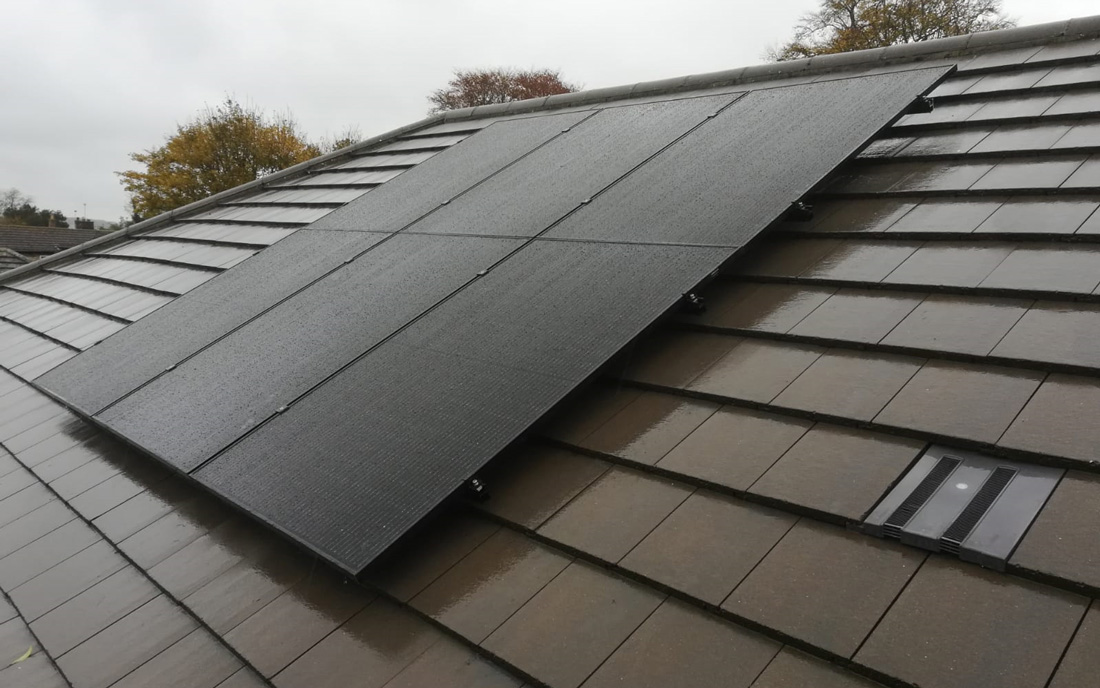Solar Panel Installations:
Benefits of Solar Panels
- Cut your electricity bills
- Reduce your carbon footprint
- Receive payments for extra energy you generate
Solar electricity panels, also known as photovoltaics (PV), capture the sun's energy and convert it into electricity that you can use in your home.
By installing solar panels, you can generate your own renewable electricity.

How do solar panels work?
A solar PV panel consists of many cells made from layers of semi-conducting material, most commonly silicon. When light shines on this material, a flow of electricity is created.
The cells don't need direct sunlight to work and can even work on cloudy days. However, the stronger the sunshine, the more electricity generated.
Solar PV systems are made up of several panels, with each panel generating around 355W of energy in strong sunlight. Typical systems contain around 10 panels and generate direct current (DC) electricity. Because the electricity used for household appliances is alternating current (AC), an inverter is installed along with the system to convert DC electricity to AC. This electricity can be used throughout your home, or exported to the grid.
Are solar panels right for me?
Do you have enough space?
Space is a key consideration. The average system size is around 3.5kWp and this will typically take up around 20m2 roof area.
An unshaded, South facing roof is ideal for maximum electrical output. East or West facing roofs could still be considered, but North facing roofs are not recommended. A system facing East or West will yield around 15-20% less energy than one facing directly South.
Shaded roofs
Any nearby buildings, trees or chimneys could shade your roof and have a negative impact on the performance of your system.
Finding an unshaded spot is best, however sometimes shading is unavoidable. Some solar PV systems can minimise the impact of shading using 'optimisers'. If you don't have shading, the use of optimisers is not necessary or beneficial, other than the increased monitoring opportunities they offer - they won't generate more energy.
Do I need permission to install a solar PV system?
Solar PV panels are considered 'permitted developments' and often don't require planning permission. However, exceptions apply and it's best to check with your local planning office for guidance. If you live in a listed building, conservation area or national park, additional restrictions may apply.
f you're planning to install a solar PV system in your home, you must register it with your Distribution Network Operator (DNO). The DNO is the company responsible for bringing electricity to your home. Usually, your installer will register the device for you.
Benefits of solar electricity
Cut your electricity bills
Sunlight is free, so once you've paid for the initial installation, your electricity costs will be reduced. Find out how much you could save by using the Solar Energy Calculator
Cut your carbon footprint
Solar electricity is low carbon, renewable energy. A typical home solar PV system could save around one tonne of carbon per year, depending on where you live in the UK.
Getting the most out of your solar PV system
Reduce your electricity use
During daylight hours, you'll be generating electricity even on cloudy days, but if you're using more power around your home than your panels are generating, or during the evening when your panels are not generating any electricity, you'll be supplementing this by importing electricity from the grid.
Reducing your electricity use can help lower your bills and reduce your carbon footprint.
-
Use more electricity during the day
As your solar PV system will be working at its peak during daylight hours, it's a good idea to run your electrical appliances such as your washing machine, dishwasher, and iron during the day. If you're at home, then this may be easier to do, but if you are away during the day, you could try setting timers for your dishwasher and washing machine.
-
Combine with other renewable systems
You can combine solar PV with other renewable technologies such as heat pumps or solar hot water systems. These technologies work well with each other, as solar PV could help power a heat pump, for example, or several of these systems could feed into a thermal store.
Costs of solar panels
The average domestic solar PV system is 3.5kWp and costs around £5,500.
The amount you will pay is influenced by the size of array and will be affected by any difficulty with access to your roof. Some of the installation costs can be shared if you already have scaffolding up for roof repairs or if you are building a new house. Costs are also affected by whether you choose panels or tiles, and whether you opt for building-integrated panels or choose panels that sit on top of your roof. Panels on top of the roof are the cheapest option, while tiles are the most expensive for the equivalent system.
The cost of ground-mounted systems is more difficult to predict, as there are more variables such as the type of mounting frame, and how far away it is from the house.
Get in touch for more information or to request a quote.